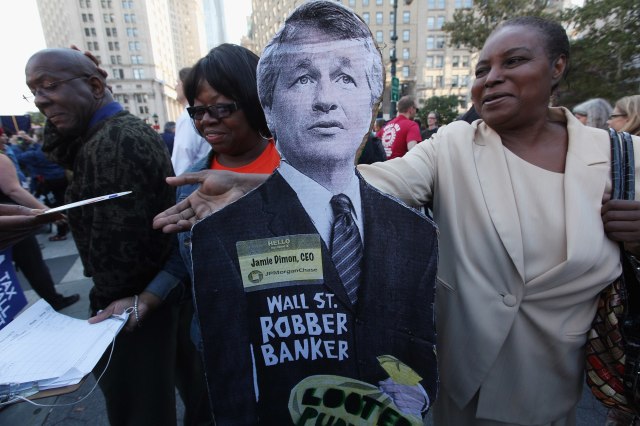Credit: Mario Tama/Getty Images

Exciting news from the world of macro-economics!
It’s all about the global financial crisis and the long, deep recession that followed it.
After thinking about these events really really hard, a handful of leading-edge economists have hit upon a truly remarkable idea. Now, make sure you’re sitting down, because I’m about to tell you what it is.
Okay, here goes: the theoretical assumption that recessions are the result of rational responses to unpredictable events might just be wrong! Furthermore, having opened oneself to this mindblowing possibility, one might even conclude that pumping cheap credit into dodgy asset classes like sub-prime mortgages is an irrational activity with entirely predictable consequences!
In other news from the frontiers of human understanding, leading theologians have uncovered the religious affiliations of the Pope; and zoologists aren’t far from finding out what bears do in their natural habitat.
Writing about recent developments in macroeconomic theory for Bloomberg, Noah Smith acknowledges the lag between academic progress and basic common sense:
“To lots of people, it seems obvious that the 2008 crisis was long in the making — the product of years of financial and regulatory folly. In general, the notion that economic booms cause busts, instead of being random unrelated events — an idea advanced by the maverick economist Hyman Minsky — seems to have much more currency beyond the ivory tower than within it.”
Smith goes on to look at the work of economists who have incorporated common sense assumptions into their theoretical models:
“All of these papers have one thing in common — they use debt to predict recessions years in advance. That fits with the emerging post-crisis wisdom that problems in credit markets are the source of both financial crashes and the ensuing economic slowdowns.”
One particular strand of thought, as advanced by Nicola Gennaioli and Andrei Shleifer, is described as the “theory of extrapolative expectations”:
“Basically, this theory holds that when asset prices rise — home values, stocks and so on — without a break, investors start to believe that this trend represents a new normal. They pile into the asset, pumping up the price even more, and seeming to confirm the idea that the trend will never end. But when the extrapolators’ money runs out, reality sets in and a crash ensues.”
I’m not sure this tells us anything we ought not to know already, but it does supply us with a corking euphemism: Instead of admitting you’re a greedy, reckless speculator just tell people that you have “extrapolative expectations.”
The real lesson to be learned here is that a flawed economic assumption isn’t just wrong; when cemented into the macroeconomic orthodoxy of the day, it is actively harmful.
Why was it that governments did so little to rein in the bankers before their reckless behaviour crashed the economy? You can accuse the politicians of complacency, arrogance and cynicism; but it was the establishment economists – who “resisted and overlooked” the idea that “recessions often emanate from the financial sector” – who provided the excuse for inaction.
One last thought: Though the idea that a financial crash is the predictable result of irrational behaviour is clearly superior to the assumption it is a rational response to an unpredictable event, we need to qualify the words ‘predictable’ and ‘irrational’.
The consequences of fuelling an economy on cheap credit are not so much ‘predictable’ as ‘inevitable’. ‘Predictable’ would suggest the timing of a crash can be determined well in advance. In reality, the only thing that we can reasonably predetermine is that the accident is waiting to happen, not when it will happen.
As for ‘irrational’, making money from deliberately inflating an asset bubble is better described as immoral. Indeed, if you’re not exposed to the consequences of its inevitable collapse, then your actions are, from a selfish, sociopathic point-of-view, entirely rational. A lot of people made a lot of money from activities that led to the financial crisis of the previous decade, and most of them are still filthy rich. What is irrational is that we’ve allowed them to get away with it.










Join the discussion
Join like minded readers that support our journalism by becoming a paid subscriber
To join the discussion in the comments, become a paid subscriber.
Join like minded readers that support our journalism, read unlimited articles and enjoy other subscriber-only benefits.
Subscribe